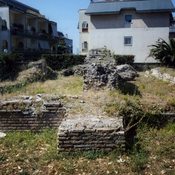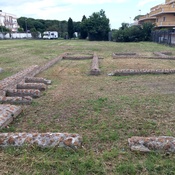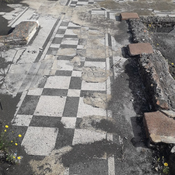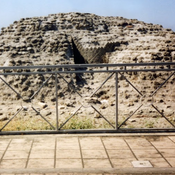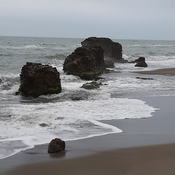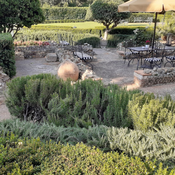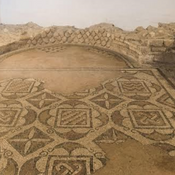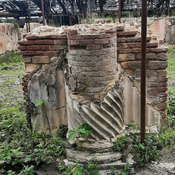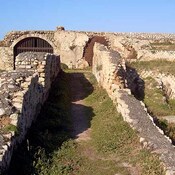Il n'y a pas une annotation en français. Présenté est une annotation en Anglais.
Cisra [also Chaisrie, Chaire, Caisra ] known in Latin as Caere, by Phoenicians named Kyšry was an Etruscan city state. The very first settlement was founded in the IX century BC on a tufa plateau naturally defended by high and steep ridges ca 7 km from the sea. Accordig to Etrusvan mythology Cisra -Caere was one of the twelve cities founded by Tyrrhenus.
Thus much for the lustre of the Tyrrheni. And still to be recorded are the achievements of the Caeretani, they defeated in war those Galatae who had captured Rome, having attacked them when they were in the country of the Sabini on their way back, and also took away as booty from the Galatae, against their will, what the Romans had willingly given them; in addition to this, they saved all who fled to them for refuge from Rome, and the immortal fire, and the priestesses of Vesta. The Romans, it is true, on account of the bad managers which the city had at the time, do not seem to have remembered the favour of the Caeretani with sufficient gratitude, for, although they gave them the right of citizenship, they did not enroll them among the citizens, and even used to relegate all others who had no share in the equal right to "the Tablets of the Caeretani."Among the Greeks, however, this city was in good repute both for bravery and for righteousness; for it not only abstained from all piracy, but also set up at Pytho what is called "the treasury of the Agyllaei"; for what is now Caerea was formerly called Agylla, and is said to have been founded by Pelasgi who had come from Thessaly. But when those Lydians whose name was changed to Tyrrheni marched against the Agyllaei, one of them approached the wall and inquired what the name of the city was, and when one of the Thessalians on the wall, instead of replying to the inquiry, saluted him with a "Chaere,"the Tyrrheni accepted the omen, and, on capturing the city, changed its name accordingly. But the city, once so splendid and illustrious, now preserves mere traces of its former self; and the hot springs near by, which are called Caeretanian Springs, have a greater population than it has — because of those who visit the Springs for the cure1.
The vicinty of the sea an naturall defence allowed the town to developed as important and trade centre spreading her trade to Corsica, Sardinia and Iberia in the VIII century. Cisra benefited from three sea ports including Pyrgi, Alslium and Punicum.
See:
- Strabo: Geography : Loeb Classical Library edition, 1923
- Nancy Thompson de Grummond, Lisa Pieraccini, Caere, University of Texas Press 2016
Références
- ↑Starbo, Book V Chapter 3
Cisra [also Chaisrie, Chaire, Caisra ] known in Latin as Caere, by Phoenicians named Kyšry was an Etruscan city state. The very first settlement was founded in the IX century BC on a tufa plateau naturally defended by high and steep ridges ca 7 km from the sea. Accordig to Etrusvan mythology Cisra -Caere was one of the twelve cities founded by Tyrrhenus.
Thus much for the lustre of the Tyrrheni. And still to be recorded are the achievements of the Caeretani, they defeated in war those Galatae who had captured Rome, having attacked them when they were in the country of the Sabini on their way back, and also took away as booty from the Galatae, against their will, what the Romans had willingly given them; in addition to this, they saved all who fled to them for refuge from Rome, and the immortal fire, and the priestesses of Vesta. The Romans, it is true, on account of the bad managers which the city had at the time, do not seem to have remembered the favour of the Caeretani with sufficient gratitude, for, although they gave them the right of citizenship, they did not enroll them among the citizens, and even used to relegate all others who had no share in the equal right to "the Tablets of the Caeretani."Among the Greeks, however, this city was in good repute both for bravery and for righteousness; for it not only abstained from all piracy, but also set up at Pytho what is called "the treasury of the Agyllaei"; for what is now Caerea was formerly called Agylla, and is said to have been founded by Pelasgi who had come from Thessaly. But when those Lydians whose name was changed to Tyrrheni marched against the Agyllaei, one of them approached the wall and inquired what the name of the city was, and when one of the Thessalians on the wall, instead of replying to the inquiry, saluted him with a "Chaere,"the Tyrrheni accepted the omen, and, on capturing the city, changed its name accordingly. But the city, once so splendid and illustrious, now preserves mere traces of its former self; and the hot springs near by, which are called Caeretanian Springs, have a greater population than it has — because of those who visit the Springs for the cure1.
The vicinty of the sea an naturall defence allowed the town to developed as important and trade centre spreading her trade to Corsica, Sardinia and Iberia in the VIII century. Cisra benefited from three sea ports including Pyrgi, Alslium and Punicum.
See:
- Strabo: Geography : Loeb Classical Library edition, 1923
- Nancy Thompson de Grummond, Lisa Pieraccini, Caere, University of Texas Press 2016
Références
- ↑Starbo, Book V Chapter 3

